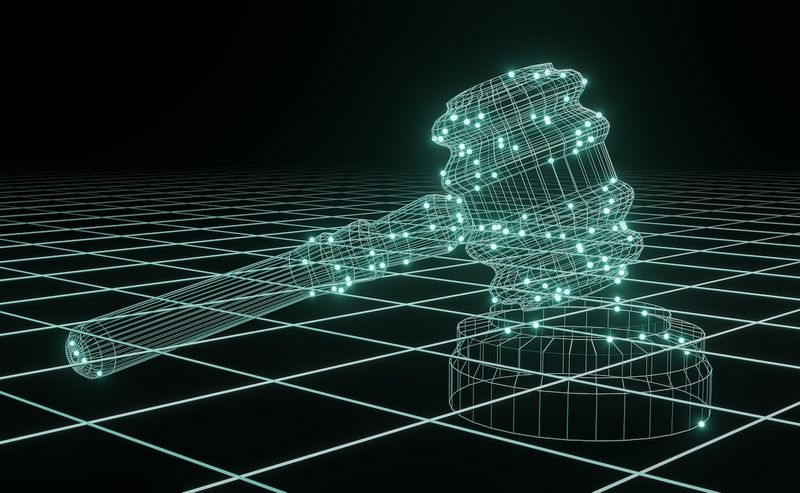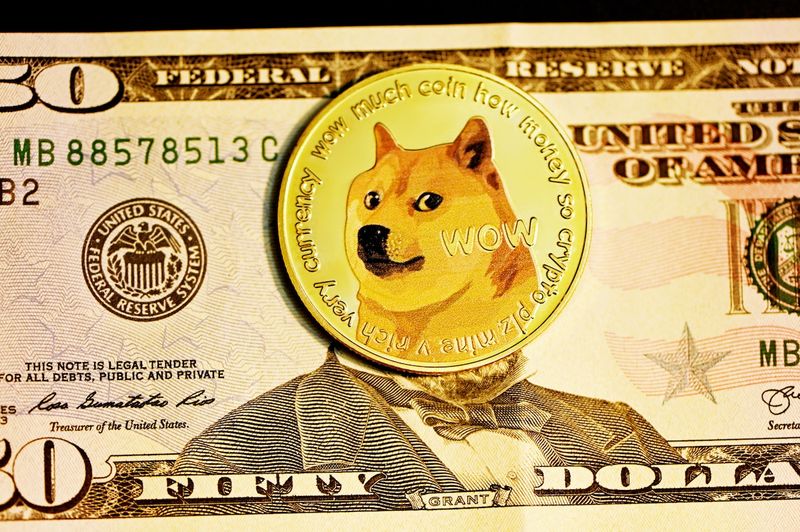It's a story as old as Bitcoin — rumblings of regulation will come from the U.S. Senate, and the crypto market will crash. But what if regulation is a good thing in the long run?
Sure, in the short term, your coins might drop 5% (okay, more like 40% — hey, you signed up for this!). However, regulation could be the key to mass adoption. This is surely the most bullish future we can think of, right?
We need good regulation if we want the world to be using the blockchain to pay for groceries, store digital identities, and more. That's the key — good regulation. One that protects users, developers, and innovators.
So, let's flip the script and break down why regulation might be good for crypto.
1. Protection from rug pulls
We often see crypto in the headlines of most major publications, but for the wrong reasons. Rug pulls are rampant. But how many people have been punished for them?
For instance, the infamous Squid game rug pull of November 2021 stole $2.5 million from the public. Who was behind it? Who knows! The money has gone with the wind, never to be seen again.
Currently, we don’t have any regulators who have the powers or the means to punish this sort of scheme. There are two ways regulation could tackle this issue:
A) At an exchange level
Exchanges could be made to require projects to supply a white paper and the creators to dox themselves. Often rug pulls won't even have a whitepaper — the bare minimum any project should have. However, rugs still happen when whitepapers are present (as with SQUID coin). Therefore, the creators doxxing themselves allows for legal repercussions for any bad actors in the space.
B) Ban cryptocurrencies that aren't approved by the government
This is obviously a bad idea. The space is expanding rapidly — not allowing new coins to be created would only stunt its growth.
For example, Avalanche (AVAX) was launched in 2020 and, within two years, has established itself as a legitimate top 10 coins. If we had governments regulating who can create a coin or token, things like this couldn't happen. When we see people freaking out at the idea of regulation, this is what they think of.
It's clear that there is a right and a wrong way to regulate cryptocurrency — those in charge must understand the difference. Sure, the second regulation may be safer, but it would kill a part of the economy which is evolving by the day. Instead, regulation should allow for innovation while creating a way to prosecute people who exploit others.
2. Prevent market manipulation
Remember when Elon Musk wouldn't stop tweeting about Dogecoin? That was kinda fucked up, right? He purchased Doge and kept tweeting about it, knowing the price would pump. Calling it his “side hustle” doesn’t help matters either. This is wrong, not to mention technically illegal.
Again, currently, we don't have enough regulation in this sector to sue someone over a tweet. Elon had previously been warned for breaking SEC rules, and this seemed like the final straw for the billionaire to be punished.
However, the SEC stated they were investigating the issue but nothing ever came of it. He has publicly stated that he owns Doge so how did this happen? A case of the SEC slacking off or something else? Who knows.
Would a KYC (Know-Your-Customer) for opening crypto wallets be a reasonable answer? Sure, it'd help track down who owns what and bring justice to market manipulators. But what about the more sly celebrity market manipulation cases?
People like Kim K advertizing EthereumMax or a Z-list rapper shilling a project they clearly don't care about. Let's not get it wrong; this is market manipulation but in the form of a paid AD. Why is this allowed for cryptocurrencies, but a hard no for stocks?
This is something regulators need to crack down on. Advertizements like these don’t paint a pretty picture and lead crypto newbies astray. It takes the focus away from the technology and puts it on more on the pump and dump schemes. Thus, regulation specific to market manipulation in crypto can be a good thing.
3. Stablecoins verified
Which stablecoin team are you on? USDC, UST, or maybe DAI? Some of you will be wondering why I didn't mention USDT (Tether) — the stablecoin with the largest market cap. Let me tell you why.
USDT is tied to many controversies. We could write a book about the Tether controversy (we encourage you to read Amy Castor's timeline about it) but essentially, people think it's not backed 1-to-1 by the US dollar as claimed. The New York Attorney General, Letitia James, has drawn this conclusion, and their severe lack of transparency doesn’t help matters.
Regulators could help bring clarity to this situation. If the SEC required stablecoins to prove how they are pegged and be publicly transparent about their operations, the critics would have their answer. Instead, we have controversy around the leading stablecoin because the team refuses to be transparent.
If USDT isn't currently fully backed by the US dollar, the regulation would force them to sort it out or enable a freefall for the coin. The latter is scary as USDT is the glue that holds a lot of the crypto market together. It's estimated that USDT is involved in half of worldwide Bitcoin trades. This may be a huge but a necessary L the space has to take. The longer we allow this beast to grow without taming it, the harder it will fall.
The Chair of the SEC, Gary Gensler, has previously stated that they plan to tackle the stablecoin issue. So, it's just a matter of time.
4. Money laundering
Ah yes, the thing crypto and NFTs are constantly accused of. Often, it's just pushed off as FUD. But it’s real and kind of a problem.
Okay, let's get the FUD out the way first. The blockchain traces every transaction that exists. This makes for a perfect way for governments and regulators to follow where the money is going — complete transparency. However, services like Tornado Cash that enable blockchain users to launder their money easily are growing in popularity.
Before you flood our social media channels with hate, yes, these mixing services are also used by privacy-concerned crypto netizens. But we would be stupid to ignore that bad actors use them heavily. For example, one of the biggest players in the game, Crypto.com had $15 million of ETH stolen and laundered through Tornado Cash.
So, how do these mixers work? Instead of sending your money from one wallet to another, they obscure the path to a new wallet. Similar to magicians with the ball under a cup.
How could regulation help fix this issue? That’s a tricky one.
KYC defeats the whole purpose of mixers, so that’s out. Banning mixers is your only real option. Historically, we've seen sites like the Best Mixer be shut down by EU Authorities. Europol called it the "first law enforcement action of its kind against such a cryptocurrency mixer service".
However, the authorities can only clamp down on mixers with a centralized server. What if a mixer functions in a completely decentralized way, then what?
I don't have the answers for this one. Thank god, I'm just a writer, and my job isn't actually to create regulation. That being said, I'm not too sure those in charge have any answers either.
5. Currency or Security?
Of course, many bulls want crypto to be treated as a currency. Not only for mass adoption but also to tackle the different taxation laws around currencies.
The SEC previously stated that most cryptocurrencies are securities but have changed their stance to call sufficiently decentralized cryptos such as Bitcoin and Ethereum as currencies. Once it is a currency, that coin no longer remains under the purview of the SEC. This is one of the reasons regulation in the space has been a bit all over the place.
Okay, before I say this, take a seat, breath, and have a glass of water. Let me play devil's advocate for a second…
Let's imagine, hypothetically, the SEC says that all cryptocurrencies are securities as a blanket statement. This would allow them to come into the space and heavily regulate the issues we've already discussed.
They could be more rigorous with finding bad actors after rug pulls or punishing celebrities for shilling projects. Veterans have learned to live with and avoid these situations, but they are hurting the space as a whole.
That being said, cryptocurrencies (mostly layer one projects) should be treated as currencies. It validates cryptocurrencies as real money to the general public. No one wants to pay for their groceries with GameStop stocks or is that a thing?
6. Validation for the general public
Honestly, I understand why everyone is freaking out about regulation. It's scary, like really scary. Done wrong and it could leave a revolutionary technology like the blockchain to rot rather than grow.
Like it or not, to the general public, cryptocurrency is seen as dangerous, scary, and confusing. We all know that these people are wrong, but they need to be convinced. Secure, high-level, and trustworthy regulation would really help change the minds of these people.
I can give you a direct example: the sport of mixed martial arts was seen as a barbaric, disgusting sport made for knuckleheads. That was until regulations were imposed on the sport.
Official rule sets were made, athletic commissions started to oversee events, and drug testing began. Fast forward to today and it is seen as a legitimate sport that even puny nerds (...such as me) can enjoy.
Regulation can validate and legitimize cryptocurrency to the wider public. In a way, it needs to do the opposite that MMA has. Crypto is already loved by us puny nerds, we just need to get the brutish knuckleheads on our side.
Check out writer Ryan S. Gladwin's website, follow him on Twitter, and of course, subscribe to the weekly Hedgehog newsletter!






